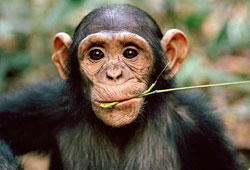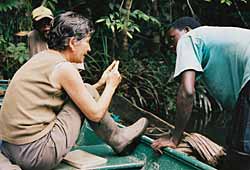We collect, take care of, and release orphaned chimpanzees from captivity.
Over 70 chimpanzees have been welcomed by HELP Congo since 1989, the majority
arriving between 1989 and 1994. Since 1994, the general focus has shifted towards the
reintroduction program, and the sanctuary is currently at maximum capacity.
 |
© Stéphanie MENG-ZIRILLI - HELP CONGO |
|
The chimpanzees are generally accepted as young individuals, sometimes less than one
year in age, seized by Congolese authorities or abandoned by individuals.
Older residents mostly arrived from the zoo of Pointe Noire (closed in 1994), while
others were moved from the Brazzaville Zoo during the socio-political war in 1997.
They were introduced to an island in the Sanctuary.
|
To date, all three of the Sanctuary islands are still inhabited by chimpanzees. The islands
provide food but not enough, so nutritional supplements of cereal, milk and fruits are
brought to them daily. |
 |
© Stéphanie MENG-ZIRILLI - HELP CONGO |
|
We reintroduce chimpanzees to their natural habitat.
Over the last 20 years, within the Triangle site (a forested area bordered by the
Conkouati lagoon within the Conkouati-Douli National Park), our program has helped
release over forty chimpanzees into a natural environment.
The undisputable success of our program has been exampled in many reputable
journals, and HELP Congo is highly recognized by the entire scientific community
We fight against poaching
Anti-poaching enforcement is essential to limit the trafficking of wild animals. Adult
animals are often killed for consumption of bush meat, mainly in Pointe Noire, and their
babies are sold as pets to Africans and travelers.
HELP Congo is involved through two avenues :
• To support the Congolese authorities, accepting seized chimpanzees and providing, if
necessary, logistical support teams within Conkouati-Douli National Park or patrols of
the waters and forests in Pointe-Noire,
• Deterring poachers by the permanent presence of our teams in the forest. Indeed,
since HELP's Triangle installment in 1996, poaching has declined sharply within
Conkouati-Douli. Wildlife has returned in number, including elephants, blue monkeys,
buffalo and cats.
The reintroduction has become a tool for further conservation.
We provide education to preserve the forest, chimpanzees and biodiversity
 |
© Stéphanie MENG-ZIRILLI - HELP CONGO |
|
Raising awareness is an integral part of our work. With the creation of HELP Congo,
actions have carried out by the Congolese government and village communities to
inform them of our objectives within Conkouati. Presentations were organized in
schools of neighboring villages to raise awareness about the preservation of the forest
and chimpanzees.
By protecting one species, we protect all species and the habitat in which they all live.
"Information and Environmental Education"
• An information and environmental education center :
Since 2007, our free education center has accommodated, informed and educated the
public on issues of environmental protection and biodiversity.
- The center has an exhibition space, library, and offers screenings of documentaries and
films on environmental issues.
- A bi-monthly press report informs the public about sustainable development and
progress in Central Africa, and Invitations to present information are offered to
associations fighting for the preservation of the environment.
- Coordination of evening discussions on international days of environmental
celebration.
• Raising awareness in schools :
Raising awareness in schools develops around animations and practical activities
that
enable children to become aware of the world around them and to adopt eco-citizen
behavior. Out field trips from the city are a time of discovery and contact with nature.
"HELP Education - For a clean school" Addresses the use of waste bins and discarding of
trash in schools.
Topics covered in class :
The environment, forest, mangroves, waste, water, Congolese wildlife, chimpanzees,
gorillas, elephants, sustainable development, renewable energy, climate change,
deforestation, etc…
|
We fight against deforestation
In the beginning, Aliette JAMART asked the question of why the villagers are poaching.
In response, it was found as mainly encouraged by those returning from cities in search
of lumber and firewood, influenced by the seemingly unaffected. So she wanted to
quickly provide populations with sustainable lumber and firewood, to stop the outside
influence. This began the implementation of firewalls, the first nursery and the first test
plantations.
Aliette was obliged to confess that planting in a savannah, sterilized by heat and runoff,
proved a challenge. But on the guidance of CIRAD (Centre for International Cooperation
in Agronomic Research for Development), the UAIC (now SCF National Centre for Forest
Research) and SNR (National Reforestation Society), the first plantations were started.
To date, we are proud of the result. A small forest now enables indigenous forest
species to grow; at the entrance of the camp xylopias take precedence over the acacias.
Now we can see many footprints of mammals, birds and insects, not to forgetting to
mention: snakes.
All plantations established from 2002 to 2006 have not yielded the expected results.
Sandy soil does not allow the development of fruit, and acacias and eucalyptus
overwhelmed other species.
We started planting palm and expected improvement after two years, but our palms
show no signs of development, other than green foliage !
Although there is great opposition in the world for planting oil palm :
In Conkouati, we planted on the barren savannah to give a canopy of shade, shelter to
animals and birds and the bees of butinner in the acacias, and eventually be able to
provide man and animals with palm fruits for their survival. As the local tribe within the
region of Conkouati had previously chopped the trees for palm wine.
|
 |
© S MENG-ZIRILLI - HELP CONGO |
|
We contribute in the scientific research of primates
At current rates of deforestation, 90% of the ape habitat will disappear in Africa by
2030. We must act now to preserve the rainforest.
The majority of Central African countries lack resources and skills in the areas of
research and conservation. Project HELP addresses action at this level.
We use our strengths (sites rich in natural environments, extensive network of scientific
partners, etc... ) to develop a program to help the development of knowledge on
ecosystems and primate habitats.
This program consists of :
• Conducting targeted witness to ecosystems and inventory studies (fauna & flora), and
mapping studies,
• Using data collected by Congolese actors to relevant conservation and environmental
management,
• Assist the Congolese government, who remain the prime contractors for the
management of their natural resources.
Since 2002, several scientific expeditions have been deployed on forest cover and
aquatic birds in the Conkouati region. These missions have set a foundation for further
future studies.
|
